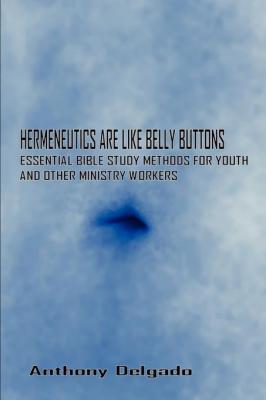 It may seem like a funny title, but Hermeneutics are like Belly Buttons
It may seem like a funny title, but Hermeneutics are like Belly Buttons is a very serious minded book. Anthony Delgado, a youth pastor from southern California, has written a concise how-to-book on hermeneutics (which is a fancy word for interpreting a Bible passage to distill God’s intended meaning) aimed at youth workers and other ministry workers.
In his preface, he argues why he thinks this book is necessary: ‘the every day youth pastor’ rarely has a degree’ and ‘very few churches hire a youth pastor from the outside’. I don’t think I agree with either, especially in these economic lean times, churches prefer youth pastors with a degree and they certainly can afford to choose the best.
That doesn’t mean I don’t see the need for a book like this, I just think there are other reasons. One is the fact that churches don’t have the money to actually hire a youth pastors and have to rely on volunteers, many of whom are indeed not theologically trained. So I do think an accessible book on hermeneutics would be a great addition to each youth worker’s library.
Hermeneutics are like belly buttons does offer a solid basis for hermeneutics for those with little or no experience in this. Anthony Delgado does a good job of explaining hermeneutical concepts, though some basic knowledge of ‘theological language’ still comes in very handy (I mean, the title presupposed people are familiar with the term hermeneutics, something I wouldn’t be so sure of).
The book is logically set up with an introduction to hermeneutics, an explanation of basic hermeneutics principles, followed by advice for each of the categories of Bible books (for instance narratives, wisdom literature, the law, etc.). He also included a chapter on ‘Exegetical Fallacies’ which I thought was a great addition since I see so many examples of false interpretation in messages and Bible studies.
The approach is solid and Biblically sound, if somewhat ambitious for many youth workers, especially if they are volunteers or part time. I’d say the book offers an ideal approach, but I do wonder how realistic this may be for many time-juggling youth workers. For them, reading the book may feel like they’re not doing a good enough job, not investing enough time, etc. A bit more compassion and understanding from the author with regards to this reality might have been wise.
In general the book is little geared towards youth workers, despite the subtitle of ‘essential Bible study methods for youth and other ministry workers’. It would have been interesting for instance to discuss if the meaning of a Bible passage can be different for teens than for adults, or how applications can differ between age groups. That would have made the book a bit more practical and applicable for youth workers.
All in all, I recommend this book for those wanting to learn more about hermeneutics and training themselves to do a solid job in reading and interpreting the Bible themselves, without overly relying on commentaries.
p.s. You can find more on the book and on Anthony Delgado on his site Einquisitive.
Disclaimer: I received this book free from the author in exchange for an honest review.
Leave A Comment